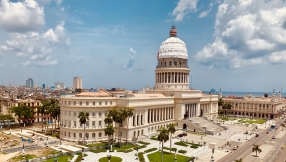The road to Cape Town 2010
“There are a number of things that we are dealing with in the 21st century that John Stott and Billy Graham could not have imagined – the rise of the megacities, hedonism, the global phenomena of diaspora people to name a few. Those challenges are new and coming into full blossom in the 21st century,” says Rev Douglas Birdsall, Chairman of the Lausanne Committee for World Evangelisation.
From 16 to 25 October 2010, more than 4,000 Christian leaders will grapple with major obstacles to world evangelisation at Cape Town 2010, the ten-day congress organised by Lausanne in collaboration with the World Evangelical Alliance.
Six issues in particular will dominate the congress agenda: the uniqueness of Christ in a pluralistic world; religious fundamentalism; obstacles to world evangelisation within the church; the shift within the world church from the Global North to South and West to East; the development of a theology of suffering and reconciliation; and the building of new partnerships to help the church advance in the unfinished task of world evangelisation.
“There are many themes that impact world evangelism. Cape Town 2010 will focus on the most important of these,” says Dr Geoff Tunnicliffe, International Director of the World Evangelical Alliance. “And of course we will look at these themes in the context of some wider issues like poverty, environmental degradation, religious persecution, HIV/AIDS, and the movements of people. Our hope is that one of the key outcomes will be a commitment to a deeper level of cooperation and demonstration of biblical unity.”
With Cape Town 2010 now firmly on the horizon, Lausanne and the WEA are hard at work with preparations to ensure the Congress impacts as many evangelicals as possible – and that means engaging them in a global conversation on the issues of the day long before the congress has even begun.
“We live in a day of multi–opportunities. There are all sort of conferences to which evangelical leaders can attend. So one of the challenges is to help leaders understand that Cape Town 2010 has the potential for being a historic gathering that can help shape the evangelism agenda for decades to come,” says Dr Tunnicliffe. “We are seeking to work in an integrated way with our Lausanne colleagues in making sure we have the right program, the right people and the right lead up to Cape Town.”
From October, Christianity Today Magazine will publish a monthly article exploring a different item on the Congress agenda, while a pre-Lausanne curriculum and study guide to the Lausanne Covenant are also in the pipeline to help congregations prepare for the congress. In the months ahead, Lausanne will continue to explore the possibility of online discussion groups, chat rooms, email, streaming audio and video, SMS/MMS and other mobile and Internet technologies. And for the first time, evangelicals around the world will be able to tune into key discussions throughout the congress via the Cape Town Global Link.
“We want to make it possible for many more people to participate in the discussions on the key issues than those who are actually able to attend the congress,” explains Rev Birdsall. “It makes a much bigger conversation possible and is just one of the things we can do to prepare the global church, create awareness and get churches involved.”
Engaging the Lausanne and WEA international networks is not only important in terms of readying delegates for the congress; it is crucial if the congress is to have any impact long after the discussion sessions have ended, the exhibition stands have been packed away, and delegates have returned to their local settings.
“Through our national alliance structures we have a strategic framework to help not only promote this important congress but also deliver the results back to many of the nations of the world. Cape Town 2010 has the potential for being a historic gathering that can help shape the evangelism agenda for decades to come,” explains Dr Tunnicliffe.
The congress may be international in scope, but Lausanne and the WEA remain keenly aware that turning its outcomes into effective global evangelisation remains a grassroots church prerogative.
Says Rev Birdsall, “We are very excited about the role of the local church in world evangelisation, and what comes out from the congress in terms of breakthroughs and how we think about and practice missions through the local church will be greatly accelerated if churches are aware of the congress and are involved in the conversation prior to it.”
All in all, Dr Tunnicliffe and Rev Birdsall are optimistic about the impact that Cape Town 2010 is going to have on the witness of the global church in the 21st century.
Says Rev Birdsall, “If there is renewal and authenticity in the life of the church, if we deal with matters of atheism and hedonism, if we are able to respond redemptively to the challenges of fundamentalism, if we develop new paradigms for ministries in megacities and diaspora peoples, and if we raise up a new generation of people for the church around the world people who have a profound commitment to discipleship, to Scripture, to evangelism, I think that will be a great contribution to the next generation.”
Dr Tunnicliffe sums up: “It is my hope that Cape Town 2010 will be catalytic in mobilizing millions of Christians around the world to be good news people living out and speaking about the transforming Gospel of Christ. Our hope is to see thousands of churches around the world become God’s instrument that will bring transformation to individuals, families, communities and nations.”













